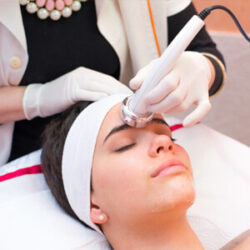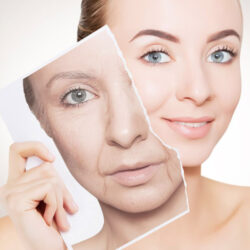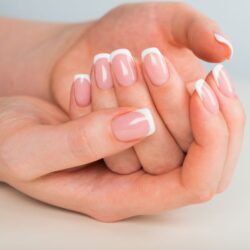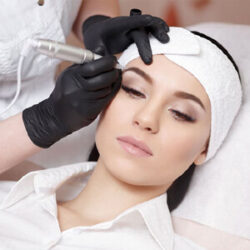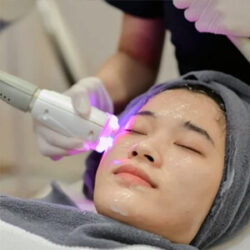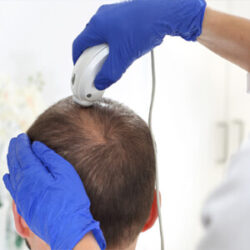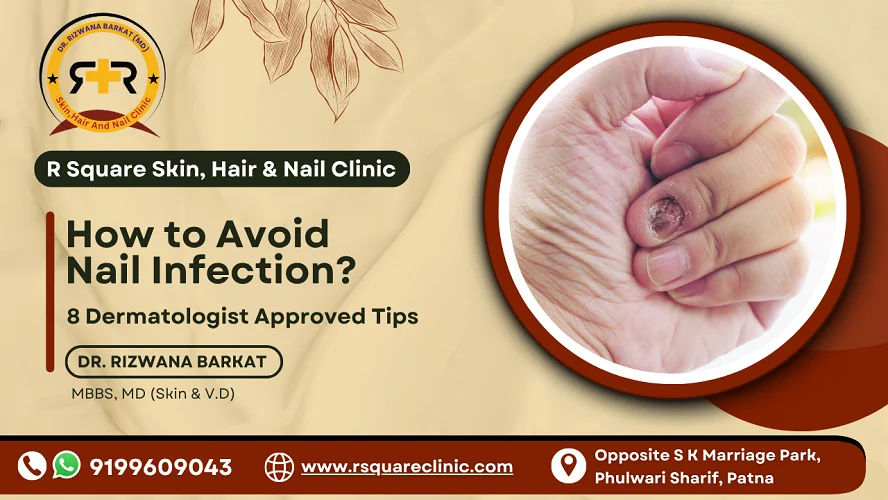Good nail health is not only about its aesthetic appeal but also about proper hygiene and general well-being. When nail care is ignored, fungal infections and bacterial contamination have a breeding ground, which will not only be painful but can also cause nail bed infections called paronychia.
Hence, nail care is of utmost importance at our dermatology clinic in Patna. In today’s blog, R Square Skin, Hair & Nail Clinic presents the top tips that enable you to keep your nails strong, clean, and infection-free.
How to Avoid Nail Infection?
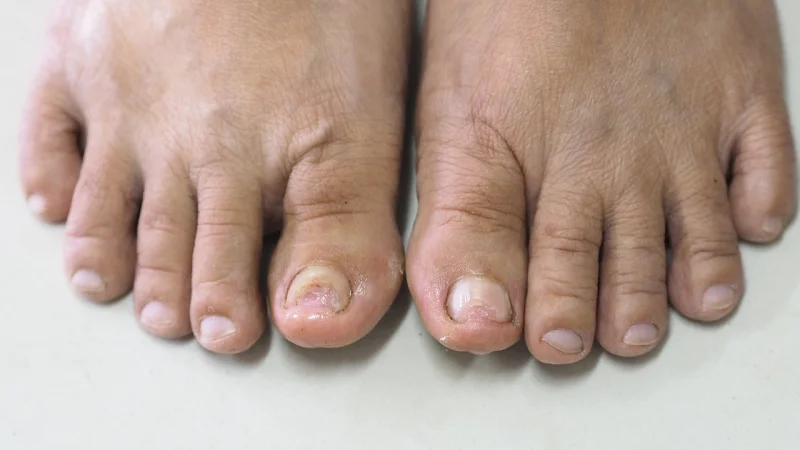
Following are some of the tips that you can follow in your day-to-day life to avoid painful nail infections and eliminate the need for surgical treatments down the line.
1. Keep Nails Clean & Dry
Regularly cleaning and drying your hands is a must if you want to be sure that moisture doesn’t accumulate and invite infection. Make the spaces between your toes and fingers a priority when cleaning, because these parts are the areas most likely to accumulate moisture.
After taking a shower or swimming, use a clean towel to dry these areas very well. Here are some more tips that can be of help:
- Use mild soap to wash hands and feet frequently whenever you’ve come into contact with unclean surfaces.
- Make sure to dry nails completely after washing because when left wet, moisture can create a perfect environment for fungal growth.
- Limit contact time with water and strong cleaning agents while using protective gloves during cleaning tasks to protect your nails.
If your work involves being in places with a lot of moisture, using an antifungal powder can be a good idea to keep your feet dry. In this way, you will not only avoid toenail infection but also your nails will stay healthy.
2. Trim & Shape Nails Properly
Preventing debris accumulation beneath the nail needs regular trimming to avoid bacterial and fungal growth.
- You should trim your nails in a straight line because curved edges tend to cause ingrown nails.
- Nail clippers need to be both sharp and clean because dull tools can split or crack the nails.
- To preserve the strength of your nails, always file them in one direction only.
- Cutting your cuticles with force should be avoided since they act as protective barriers against infections.
Toenail trimming should not be done very short because this practice can lead to ingrown nails. Use rubbing alcohol to sterilize your nail tools before every use because this will prevent nail fungus from spreading from one nail to another or between different family members.
3. Moisturize Nails & Cuticles
The right amount of moisturizing acts as a shield against microorganisms while it supports the health of the nail bed.
- Applying hand cream or cuticle oil daily will protect your skin from cracking.
- The selected hand creams should include ingredients like jojoba oil, vitamin E, and shea butter.
- The use of nail polish removers that contain acetone should be avoided because they dry out nails.
Apply moisturizer immediately following hand washing and before you go to bed for the best absorption results.
If any issues persist, the best professional care for your nail issues can be sought from a top-rated dermatologist in Patna who offers personalized treatment plans according to your needs.
4. Avoid Nail Biting & Picking
Continuous nail biting weakens the nail structure while creating entry points for pathogens. People who struggle with nail biting should keep their nails short and practice good oral hygiene to prevent nail fungus on hands.
- The act of nail biting transfers fungi and bacteria from your hands to your mouth and in the opposite direction too.
- The act of cutting cuticles leads to open wounds which can subsequently develop infections.
- The application of bitter-tasting nail polish can also function as a deterrent against nail biting.
Use stress-relief tools like fidget toys and stress balls to redirect your nervous energy from nail biting.
5. Wear Protective Footwear in Public Areas
Warm moist public areas serve as ideal environments for fungal spores which lead to toenail infections.
- You should protect yourself from fungal infections by wearing flip-flops in gym showers and pool areas as well as locker rooms.
- Using shoes with ventilation helps prevent bacteria from growing in your feet’s moisture.
When possible, choose footwear made from natural materials since they provide better breathability. The practice of switching between multiple pairs of shoes allows complete drying time which helps avoid fungal nail infection.
6. Be Cautious with Nail Salons
The first step for you should be to inquire about the sterilization procedures when you schedule your appointments.
Professional salons employ hospital-grade disinfectants in combination with autoclave sterilization for their metal instruments. You should leave the salon right away if you notice any indication of unclean practices and seek nail services elsewhere.
- You should verify that nail tools get adequate sterilization or bring your own tools when getting a manicure.
- Stay clear of nail salons that reuse their nail files or buffers because these tools can carry bacteria.
- There should be proper disinfection of foot baths before the next client uses them.
Nail salons are a major culprit in causing nail infections due to unhygienic practices. In case you do face post-treatment issues or notice redness and swelling, it’s best to book medical consultation right away. Medical care for severe nail issues can be obtained from qualified dermatologists in Patna who provide sterile procedures for ingrown toenail treatment in Patna.
7. Recognize Early Signs of Infection
Watch for:
- Redness, swelling, or pain around nails
- White/yellow discoloration (fungal infection)
- Pus or foul odor (bacterial infection)
- Nail thickening or crumbling
You should consult with a dermatologist right away whenever you detect any of these signs. Early detection enables quick treatment that can stop nail infection pain from becoming worse.
The most effective treatment for toenail fungus demands professional diagnosis to determine the specific infection type and suitable medication.
8. Maintain a Healthy Diet for Strong Nails
The body naturally fights infections better with enough nutrition while also healing faster when nail problems do occur.
- Strong nails can be maintained by consuming biotin-rich foods such as eggs and nuts while eating protein-rich lean meats and iron-packed leafy greens.
- Brittle nails signal your body requires more fluid consumption to maintain hydration levels.
The health of nails also depends on zinc as well as calcium. Thus, your meals should contain dairy products along with fish and whole grains.
Nail Care Don’ts
You should never disregard continuing nail discoloration or pain because they could signal serious medical issues.
- Using the same nail clippers and files for multiple people allows fungal infections to spread between users.
- Individuals with nail infection risks should avoid artificial nail use since these products retain moisture.
- Early treatment of nail problems helps prevent additional health complications from developing.
- Avoid walking barefoot in public restrooms, hotel rooms, and changing areas since infectious organisms thrive on these surfaces.
- A harsh nail trimming technique that reaches into corners creates open wounds through which bacteria can enter.
- The protective nail barrier gets damaged by both nail polish peeling and picking at loose cuticles.
- Using the same towel between infected nails and healthy nails should be avoided because it allows fungal spores to transfer from infected areas to healthy ones.
Any minor changes in nail texture, colour, or growth patterns should never be dismissed. Most importantly, people with excessive foot sweating need to avoid the use of tight non-breathable footwear for extended periods of time.
Moreover, what kills toenail fungus permanently is typically a combination of prescription medications which only healthcare professionals or a qualified dermatologist can provide following proper medical evaluation.
So, make sure you consult a board-certified dermatologist if there’s redness, swelling, or other signs of infection in and around the nails. Timely intervention can prevent future complications and help you find relief.
Protect Your Nails, Prevent Infection Today!
Healthy nails depend on following proper hygiene practices combined with gentle care and protective measures. Your efforts to take these steps will both stop painful infections and help you maintain nail appearance.
When home remedies fail to cure fingernail fungus fast, the patient typically requires professional medical assistance.
For comprehensive nail care and treatment of persistent nail problems, seek a consultation from Dr. Rizwana Barkat at R Square Skin, Hair, Nail Clinic. Along with specialized dermatological services, Dr. Barkat has extensive experience in treating various nail conditions. She can provide personalized treatment plans that address both acute infections along with long-term nail health maintenance.
Contact us for all your nail care needs and treatment of long-lasting nail conditions. Book a consultation today to receive professional nail care services your nails deserve.

